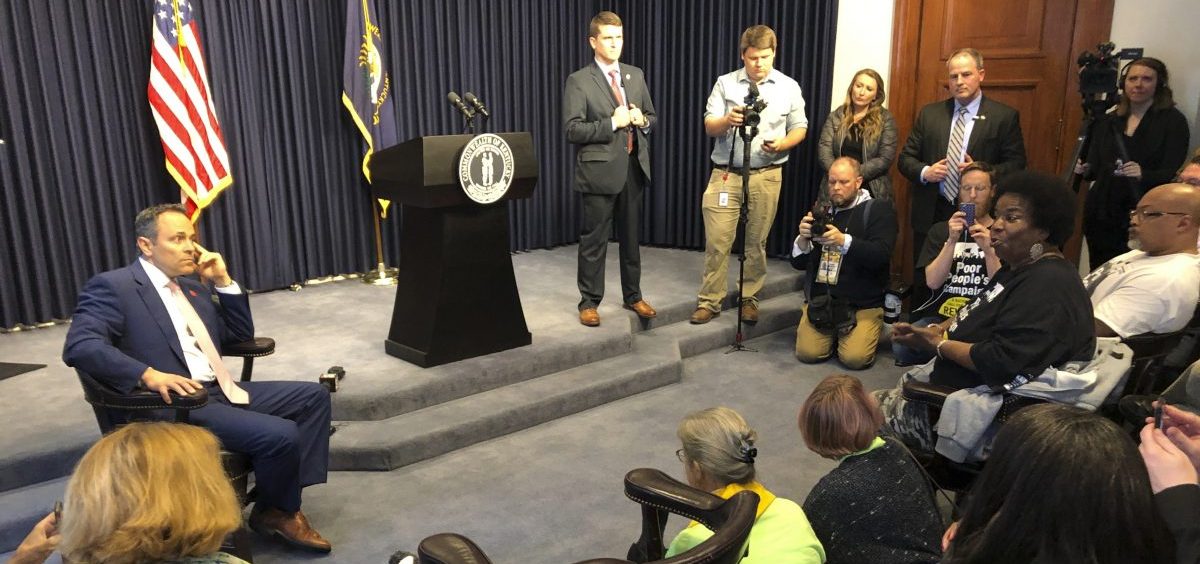News

Sit-In Prompts Meeting With Kentucky Governor About Poverty
By: Associated Press
Posted on:
FRANKFORT, Ky. (AP) — Hoping to confront Kentucky’s Republican governor, representatives from the rebooted Poor People’s Campaign showed up at his office on Tuesday and refused to leave until they got a face-to-face meeting.
And instead of getting arrested, they got the meeting.
The group landed a 20 minute in-person session with Gov. Matt Bevin in front of TV cameras for an emotional conversation about voting rights, health care and gun violence.
“Governor, you said you was poor and you was raised up poor. Did you forget what that felt like?” asked Tayna Fogle, who said she spent 10 years in prison for fraud and drug charges.
“Not at all,” he replied, shaking his head.
Fogle told Bevin about her experience losing her right to vote because of a felony conviction. Kentucky is one of three states that imposes a lifetime voting ban on convicted felons.
Felons can get their rights restored if they get their record expunged, a complicated process that requires a $500 filing fee and an order from a judge. Or they can get a limited pardon from the governor.
Since taking office, Bevin has restored the voting rights of 981 people out of 1,765 applications, according to a report by the League of Women Voters of Kentucky. That same report showed more than 312,000 people in Kentucky could not vote because of a felony conviction, a 67 percent increase since 2006.
Bevin said Tuesday the only way to change it is for the legislature to propose an amendment to the state’s Constitution that would have to be approved by voters. People in the crowd were quick to remind Bevin that former Democratic Gov. Steve Beshear signed an executive order in 2015 that set up a process to automatically issue limited pardons to convicted felons who have completed their prison sentence.
But Bevin rescinded that order when he took office, calling it unconstitutional.
“You can do anything if you want to disregard the law,” Bevin told the group when they pressed him about why he reversed Beshear’s executive order.
“I would be delighted to see this gone,” Bevin continued. “But the only people that can do it are the people who would vote to change the Constitution.”
Bevin listened while others spoke, including 17-year-old Laurel Mayes. The senior at Barren County High School urged Bevin not to sign laws that would let teachers and staff carry guns in schools. She also urged him to push for restrictions on gun sales.
“It is not OK to fight fire with fire. We are a nonviolent movement,” she said. “Actual physical guns are what caused those deaths.”
It was Bevin’s first face-to-face meeting with the Poor People’s Campaign, whose roots trace back to the Rev. Martin Luther King Jr. Last summer, the group was denied access for a protest at the state Capitol after Kentucky State Police said they were worried the group had planned to spend the night. The group was eventually let in about a month later.
Bevin has a history of meeting with groups that don’t support him. While campaigning for governor, he once stopped by the Kentucky Democratic Party headquarters to complain about their sign that declared “You still can’t trust Matt Bevin.” In 2017, he paused to speak with union workers who were angry about his support for a bill that would outlaw mandatory union dues. The bill eventually became law.
Kentucky is one of three states that will elect governors in 2019. Bevin is seeking a second term. He has been traveling the state for months, holding town hall-style meetings that have often featured hostile audiences.

